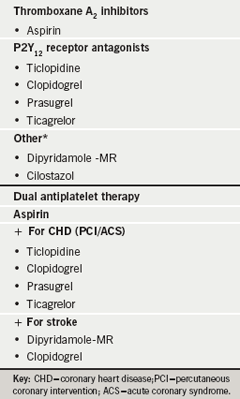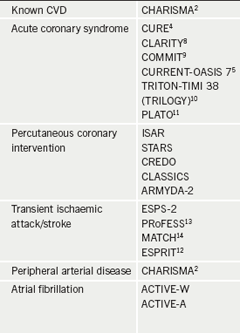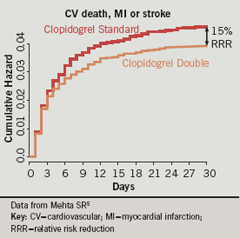Aspirin has revolutionised the management of cardiovascular disease (CVD) but it is apparent that clinical outcomes need to be improved further. The three-year follow-up of the Reduction of Atherothrombosis for Continued Health (REACH) registry shows that, despite optimal medical therapy with aspirin, beta-blockers, angiotensin-converting enzyme (ACE) inhibitors and statins, the risk of recurrent myocardial infarction, stroke and vascular death remains high for patients with coronary artery disease, cerebrovascular disease and peripheral arterial disease, especially for those with a high symptom burden.(1)
Dual antiplatelet therapy for all CVD patients?

Currently used antiplatelet drugs are summarised in table 1 and pivotal clinical trials of dual antiplatelet therapy in table 2.
The Clopidogrel for High Atherothrombotic Risk and Ischaemia Stabilisation, Management and Avoidance (CHARISMA) trial2 is the only prospective randomised clinical trial to evaluate the efficacy and safety of dual antiplatelet therapy in all CVD patients. Initiated after the Clopidogrel versus Aspirin in Patients at Risk of Ischaemic Events (CAPRIE) trial had shown a 9% relative risk reduction with clopidogrel compared with aspirin in patients with CVD,3 CHARISMA evaluated the combination of aspirin plus clopidogrel or placebo in approximately 16,000 patients. About 80% of participants had a documented CVD event (symptomatic) and the remainder had multiple risk factors for CVD (asymptomatic). The primary efficacy end point of death, myocardial infarction and stroke was not reduced for the whole cohort (relative risk [RR]= 0.93, 95% confidence intervals [CI] 0.83–1.05), showing no benefit overall. However, an analysis restricted to the subgroup of symptomatic patients found a 12% reduction in future ischaemic events, which just achieved statistical significance (RR= 0.88, 95% CI 0.77–0.998; p=0.046). The price for this was an increase in bleeding, with a significantly higher risk of moderate bleeding events and trends to increased risk of severe and fatal bleeding events in those randomised to dual antiplatelet therapy. These data therefore do not support the routine use of dual antiplatelet therapy with aspirin and clopidogrel for all patients with cardiovascular disease. This pharmacological approach would be more appropriately used in patients for whom future atherothrombotic risk is sufficiently high that it outweighs the increased bleeding risk associated with aspirin and clopidogrel duotherapy.
Dual antiplatelet therapy in ACS patients

Patients with acute coronary syndromes (ACS) are at particularly high risk of recurrent non-fatal and fatal atherothrombotic events. Consequently, this group is likely to show net clinical benefit from a strategy of dual antiplatelet therapy, providing that the risk of bleeding does not outweigh the reduction in recurrent ischaemic events. Antiplatelet drugs play a pivotal role in reducing thrombus burden as well as the risk of recurrent thrombus formation leading to recurrent myocardial infarction (MI) or stent thrombosis.
The first major trial to address the role of antiplatelet therapy in patients with acute coronary syndromes (ACS) was the Clopidogrel in Unstable Angina to Prevent Recurrent Events (CURE) trial.4 In all, 12,562 patients who had presented within 24 hours of the onset of symptoms were treated with aspirin and randomised to receive clopidogrel (300 mg immediately then 75 mg/day) or placebo. Long-term treatment (3 to 12 months) with dual antiplatelet therapy in this high-risk group reduced the incidence of death from cardiovascular causes, non-fatal myocardial infarction or stroke from 11.4% with aspirin alone to 9.3% with dual therapy (RR= 0.80, 95% CI 0.72–0.90). This was associated with a 38% increase in the risk of major bleeding but dual therapy still conferred a net clinical benefit. Recent clinical trials5-10 demonstrate that dual antiplatelet therapy with aspirin and clopidogrel achieves net clinical benefit in patients with ACS, with those undergoing immediate or early PCI achieving the greatest benefit (with a 30–46% relative risk reduction compared to aspirin alone).

More recently, the Clopidogrel optimal loading dosage to reduce recurrent events/optimal antiplatelet strategy for interventions (CURRENT-OASIS 7) trial investigators reported the results of a 2 x 2 factorial randomised controlled trial which sought to compare high (300–325 mg/day) versus low (75–100 mg/day) maintenance doses of aspirin and standard-dose (300 mg loading dose then 75 mg/day) versus double-dose (600 mg then 150 mg/day for seven days then 75 mg/day) clopidogrel in 25,087 patients receiving an early invasive management strategy for both non-ST elevation and ST elevation ACS.5 No significant differences in the primary composite end point of cardiovascular death, non-fatal MI or stroke were observed between the high- and low-dose aspirin groups (figure 1). A 15% reduction in recurrent ischaemic events attributable to double-dose versus single-dose clopidogrel was only shown in patients who received PCI, mainly due to a reduction in recurrent MI and stent thrombosis. However, the risk was increased by approximately 40% in the PCI group who received high-dose clopidogrel. Interestingly, the risk of bleeding appeared to be independent of the aspirin dose. For every 1,000 patients receiving early PCI for ACS, the high-dose clopidogrel strategy was estimated to prevent six recurrent MIs and seven stent thromboses, but with the risk of three additional severe bleeds. This treatment strategy should therefore be restricted to high-risk ACS patients receiving early PCI.
New antiplatelet agents
New antiplatelet agents have been developed in an attempt to reduce further recurrent atherothrombotic events in patients with ACS. Prasugrel is a more potent and rapidly acting thienopyridine antiplatelet agent compared to clopidogrel. In the Trial to assess improvement in therapeutic outcomes by optimizing platelet inhibition with prasugrel – thrombolysis in myocardial infarction (TRITON-TIMI 38) study,10 patients undergoing PCI for non-ST elevation and ST elevation ACS were randomised at the time of coronary angiography to receive either conventional dose clopidogrel (300 mg loading dose and 75 mg maintenance) or prasugrel (60 mg loading dose and 10 mg maintenance) in addition to aspirin. In the overall study population, prasugrel was associated with a 19% relative risk reduction in cardiovascular death, recurrent MI and stroke, at a cost of a 30% increase in major bleeding. The elevated bleeding risk was particularly marked in patients with a history of stroke, body weight below 60 kg and aged 75 years and above, which encompasses a considerable number of patients admitted with ACS in routine clinical practice. Furthermore, the role of prasugrel in the medical management of patients with ACS remains unknown and will be investigated in the TRILOGY trial.
Most recently, the Platelet inhibition and patient outcomes (PLATO) trial showed that, compared to clopidogrel, treatment with ticagrelor, a reversible P2Y12 receptor antagonist, in addition to aspirin improved outcomes in ACS patients irrespective of whether they received early PCI. No significant increase in the risk of bleeding was observed compared to patients randomised to clopidogrel.11 This pivotal trial is the first to demonstrate a significant reduction in total mortality in ACS patients.
Dual therapy in stroke patients
In patients with minor stroke or transient ischaemic attack, the European/Australasian stroke prevention in reversible ischaemia trial (ESPRIT) showed that adding dipyridamole to aspirin significantly reduces the risk of recurrent cerebral ischaemic events.12 However, recent data have challenged the role of dual therapy. The Prevention regimens for effectively avoiding second strokes (ProFESS) trial showed that the event rates for recurrent stroke (which is the major recurrent adverse event in stroke patients) or for a combined end point of death, stroke and myocardial infarction are not significantly different in patients randomised to either clopidogrel monotherapy or aspirin plus dipyridamole.13 Furthermore, the Aspirin and clopidogrel compared with clopidogrel alone after recurrent ischaemic stroke or transient ischaemic attack in high-risk patients (MATCH) trial showed no advantage in terms of either recurrent stroke or level of disability by adding aspirin to clopidogrel monotherapy.14
Conflict of interest
None declared.
References
- Alberts MJ, Bhatt DL, Mas JL et al. Three-year follow-up and event rates in the international REduction of Atherothrombosis for Continued Health Registry. Eur Heart J 2009;30:2318-26.
- Bhatt DL, Fox KA, Hacke W et al; CHARISMA Investigators. Clopidogrel and aspirin versus aspirin alone for the prevention of atherothrombotic events. N Engl J Med 2006;354:1706-17.
- CAPRIE Steering Committee. A randomised, blinded, trial of clopidogrel versus aspirin in patients at risk of ischaemic events (CAPRIE). Lancet 1996;348:1329-39.
- The Clopidogrel in Unstable Angina to Prevent Recurrent Events Trial Investigators. Effects of Clopidogrel in Addition to Aspirin in Patients with Acute Coronary Syndromes without ST-Segment Elevation. N Engl J Med 2001;345:494-502.
- Mehta SR. A randomized comparison of a clopidogrel high loading and maintenance dose regimen versus standard dose and high versus low dose aspirin in 25,000 patients with acute coronary syndromes: Results of the CURRENT OASIS 7 Trial. European Society of Cardiology Congress. Barcelona. 29 Aug – 02 Sep 2009.
- Mehta SR, Yusuf S, Peters RJ et al; Clopidogrel in Unstable angina to prevent Recurrent Events trial (CURE) Investigators. Effects of pretreatment with clopidogrel and aspirin followed by long-term therapy in patients undergoing percutaneous coronary intervention: the PCI-CURE study. Lancet 2001;358:527-33.
- Fox KA, Mehta SR, Peters R et al; Clopidogrel in Unstable angina to prevent Recurrent ischemic Events Trial. Benefits and risks of the combination of clopidogrel and aspirin in patients undergoing surgical revascularization for non-ST-elevation acute coronary syndrome: the Clopidogrel in Unstable angina to prevent Recurrent ischemic Events (CURE) Trial. Circulation 2004;110:1202-08.
- Sabatine MS, Cannon CP, Gibson CM et al; Clopidogrel as Adjunctive Reperfusion Therapy (CLARITY)-Thrombolysis in Myocardial Infarction (TIMI) 28 Investigators. Effect of clopidogrel pretreatment before percutaneous coronary intervention in patients with ST-elevation myocardial infarction treated with fibrinolytics: the PCI-CLARITY study. J Am Med Assoc 2005;294:1224-32.
- Chen ZM, Jiang LX, Chen YP et al; COMMIT (ClOpidogrel and Metoprolol in Myocardial Infarction Trial) collaborative group. Addition of clopidogrel to aspirin in 45,852 patients with acute myocardial infarction: randomised placebo-controlled trial. Lancet 2005;366:1607-21.
- Wiviott SD, Braunwald E, McCabe CH et al; TRITON-TIMI 38 Investigators. Prasugrel versus clopidogrel in patients with acute coronary syndromes. N Engl J Med 2007;357:2001-15.
- Wallentin L, Becker RC, Budaj A et al. Ticagrelor versus clopidogrel in patients with acute coronary syndromes. N Engl J Med 2009;361:1045-57.
- ESPRIT Study Group. Aspirin plus dipyridamole versus aspirin alone after cerebral ischaemia of arterial origin (ESPRIT): randomised controlled trial. Lancet 2006;367:1665-73.
- Sacco RL, Diener HC, Yusuf S et al; PRoFESS Study Group. Aspirin and extended-release dipyridamole versus clopidogrel for recurrent stroke. N Engl J Med 2008;359:1238-51.
- Diener HC, Bogousslavsky J, Brass LM et al; MATCH investigators. Aspirin and clopidogrel compared with clopidogrel alone after recent ischaemic stroke or transient ischaemic attack in high-risk patients (MATCH): randomised, double-blind, placebo-controlled trial. Lancet 2004;364:331-7.
